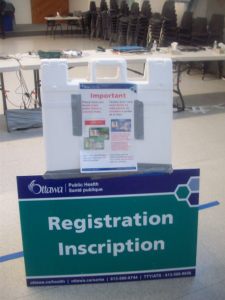By Mark Brownlee
The economic downturn has forced Ontario residents to use food banks more than ever before.
According to a report issued Tuesday by the Ontario Association of Food Banks, over 375,000 Ontarians use food banks each month, a 19 per cent rise since the fall of 2008.
Ottawa posted one of the largest provincial increases in food bank use, jumping two per cent in 2008 and about ten per cent in 2009.
“There is little doubt that it has been our most difficult year in a generation,” wrote Adam Spence, the report’s author and the association’s executive director.
The report comes just one day after Statistics Canada reported that the Canadian economy posted a 0.1 per cent gain in the third quarter of this year, which technically means the recession is over.
But the food bank report says that Ontario residents are still feeling the effects of the recession. Only one-third of people using food banks in the province are either currently employed in full- or part-time jobs or were employed in the last six months.
“The shocking numbers offer a front line reality that is a counterpoint to the green shoots and leading economic indicators that point to a ‘technical’ end to the recession,” wrote Spence.




 Posted by mbrownle
Posted by mbrownle 









